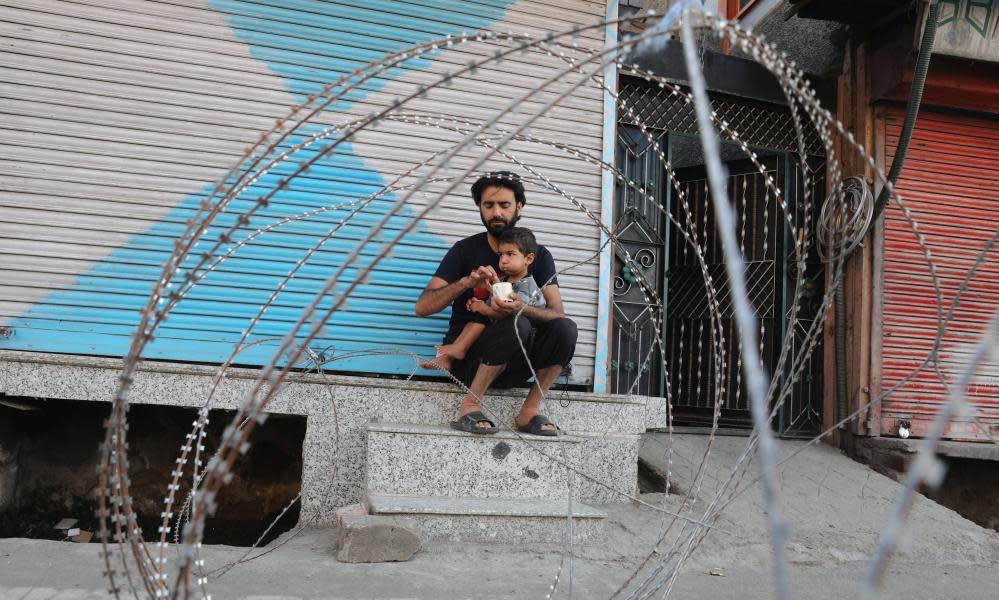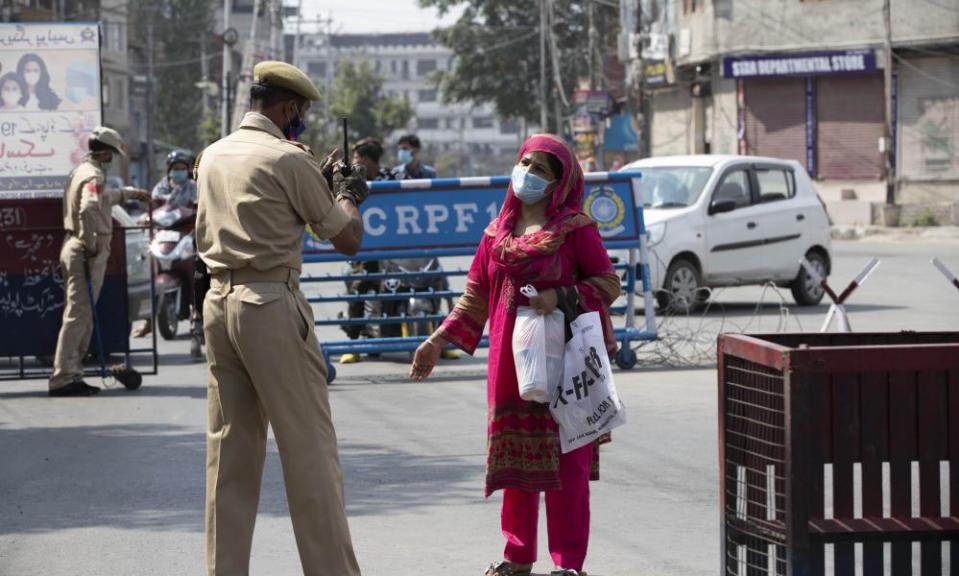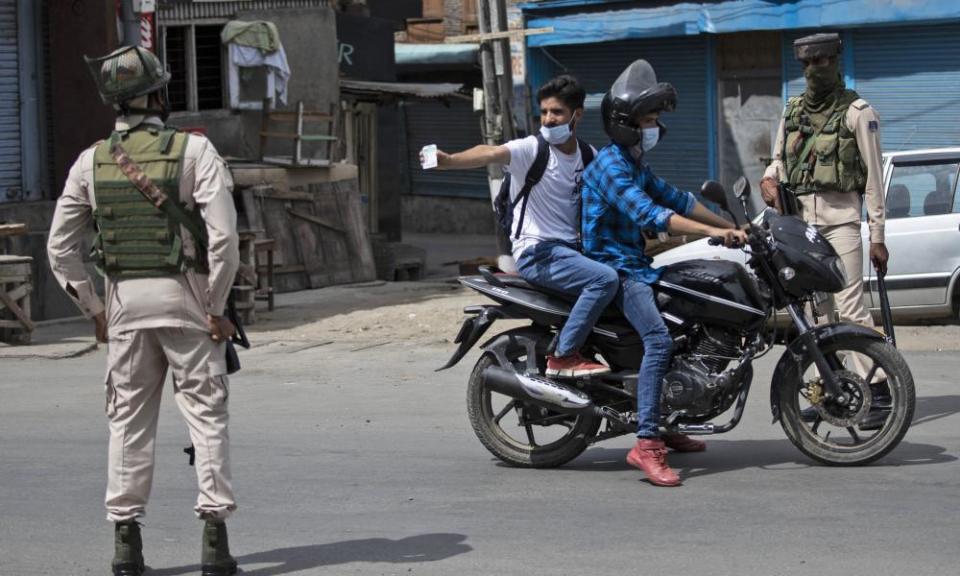'Our identity has been robbed': life in Kashmir after a year of crisis

For the past year, Fayaz Tilgami’s poetry has spoken of nothing but loss: a lost home, a lost language, a lost world. “We have lost our existence; it has been snatched from us,” said the 70-year-old Kashmiri poet, his voice heavy with sorrow.
A year ago, on 5 August 2019, the Indian government, led by prime minister Narendra Modi, repealed article 370 of the Indian constitution. For almost 70 years, the provision had given the disputed, majority-Muslim state of Jammu and Kashmir a semi-autonomous status, with special powers over issues such as jobs and residency. The special status had been granted to Kashmir in exchange for joining the Indian union after independence in 1947.
In one fell swoop, everything changed. With a swift presidential order, the Himalayan region was brought under the full control of the Hindu nationalist Bharatiya Janata party (BJP) government and split into two union territories, no different from any other Indian state. Its politicians were imprisoned, phone services were suspended, an internet blackout was imposed and thousands of Indian military troops moved into the region to enforce a strict crackdown, which has still not been fully eased. Journalists reporting on the situation in Kashmir continue to be questioned and arrested under anti-terrorism laws.
“It is not merely our land but it is also our identity which has been robbed,” said Tilgami. He described the repeal of article 370 as an “extreme disaster” that had left the whole region in a state of paralysis. “Our tongues, our pens have been sealed,” said Tilgami.
(February 26, 2019) Kashmir airstrikes
Modi authorises limited airstrikes across the “line of control” in Kashmir. He acted after the Valentine’s Day massacre by Islamist terrorists based in Azad Kashmir that killed 44 Indian paramilitaries. The attack was celebrated in India, but it was unclear whether anything significant had been struck by the fighter jets. Pakistan said the war planes made it up to five miles inside its territory before they were rebuffed, dropping their payloads without casualties or damage.
(April 12, 2019) BJP nominates accused terrorist for parliament
Modi's party shocked the political establishment by nominating Pragya Singh Thakur, a Hindu nun accused of involvement in a terrorist attack targeting Muslims, for a seat in the state of Madhya Pradesh. Thakur handily won the seat in the May elections and was appointed to a parliamentary committee on defence - from which she was sacked eight days later for describing Gandhi's assassin as a "patriot".
(May 30, 2019) Retains PM role
Modi is sworn in as prime minister for the second time after his Bharatiya Janata Party won 303 seats, further increasing their substantial majority.
(June 30, 2019) Muslim women bill
Modi's government pass the Muslim Women (Protection of Rights on Marriage) Act which confirmed the Superem Court of India's 2017 ruling that the triple talaq, which enables men to instantly divorce their wives, is unconstitutional.
(October 31, 2019) Kashmir's status
Delhi formally revokes the constitutional autonomy of Kashmir in an attempt to integrate it fully into India. The state was formally taken under direct federal control and split into the territories of Jammu and Kashmir, and Ladakh, bringing an end to decades of semi-autonomous rule. The decision to tighten the government’s grip over the region stoked anger and resentment.
(November 12, 2019) Modi's party says it will conduct nation-wide citizenship checks
Modi's right-hand man, home minister Amit Shah, tells parliament he will seek to have every Indian prove their citizenship in order to root out illegal migrants. The citizenship checks are modelled on a process that took place this year in Assam state which has left 2m people in legal limbo and was criticised by the UN as "an enormous blow to global efforts to eradicate statelessness".
(December 11, 2019) Citizenship bill
A new citizenship bill provides a path to citizenship for religious minorities who have immigrated into India from Pakistan, Bangladesh and Afghanistan before 31 December 2014. It explicitly lists Hindus, Sikhs, Buddhists, Jains, Parsis and Christians as being able to take advantage of the new provisions, excluding Muslims. Street protests begin as a result.
The repeal of article 370 was justified by the Modi government on the grounds of bringing economic prosperity to the turbulent region, opening it up to outside investment, and eliminating Pakistan-supported militants. “Repealing article 370 shut the gateway to terrorism,” claimed the home affairs minister, Amit Shah.
Yet residents of Kashmir have instead found themselves living in a region far more volatile, unstable and economically fragile than ever. The impact of the crackdown, in particular a six-month internet shutdown, led to huge economic losses and unemployment and cost the Kashmiri economy an estimated $5.3bn (£4bn) – a situation only worsened by the coronavirus lockdown that followed.
The Indian government did little to encourage economic prosperity other than to change strict domicile rules, which had previously prevented non-Kashmiris from buying land, property and investing in the region. Non-Kashmiris have been granted residency in the state since last August.

For Kashmiris, the residency status for non-Kashmiris was proof that Modi’s real aim was to advance the Hindu nationalist agenda of his BJP government, which wants to establish India as a Hindu rather than secular country, by shifting the demographics of the region away from being majority Muslim.
Sibtain, a 33-year-old from Srinagar, said he felt “maddened” at the very real prospect of becoming “a second-class citizen”.
“The worst fear I have is that Kashmir will lose its identity, we will just be subsumed into a much bigger Hindu India,” he said.
The security situation remains equally precarious, seeping into the lives of all those living in the region, with civilians dying and houses destroyed.
Rather than bringing calm to the region, a heavy security presence and and counter-insurgency campaign has instead led to weekly violent encounters between Indian troops and a new generation of militants. According to human rights organisations, between 1 January and 20 June, there were 229 killings, of which 32 were civilians, 54 were government forces and 143 were militants, while 48 properties were destroyed.
“There is not a single house in the district which has not been searched and not a single village where the [counter-insurgency] operation may not have been launched,” said a resident of Shopian district in south Kashmir.
Despite being outnumbered, inexperienced and poorly armed, radicalised young militants have revived a dying insurgency..
Shakoor Farooqi was in his late teens when he disappeared without a trace last year. His father, shoe-shop owner Farooq Ahmad, showed the last photograph taken of his youngest son, whom he lovingly called “jigar” or sweetheart.

Farooqi was killed in a gunfight in June, having refused the offer to surrender when he was cornered by Indian forces in a house in Srinagar, alongside two other militants. Ahmad was called by authorities to the scene to try and convince his son to surrender, but his desperately shouted pleas went unanswered. “There were curtains drawn on the windows and there was not a single whisper from there,” said Ahmad. “It was like a war on the border, there were so many policemen.”
Ahmad believes his son was “martyred”. “A father goes through so much pain to raise his children. It is so unfortunate what happens here,” he said.
Repealing article 370 has also had security reverberations on a geopolitical level. Many believe that China’s recent incursions into disputed territory in Ladakh, the Himalayan border region adjacent to Kashmir, were partly prompted as a retaliatory move in response to India taking full control of Kashmir. India-Pakistan relations, meanwhile, have rarely been so fraught.
Sitting in his home in north Kashmir’s Tilgam, the village known for producing generations of poets, Tilgami said he would keep writing poetry that documented the despair still so potent in Kashmir, even though he has been repeatedly threatened with arrest by security agencies.
“The poetry is no longer about love,” said Tilgami. “It is about what one feels around; the helplessness, the chaos. There are dead everywhere.”


